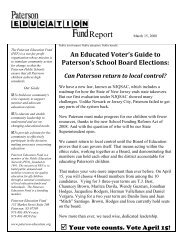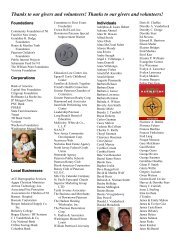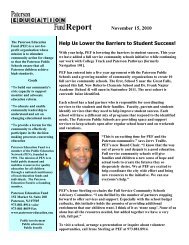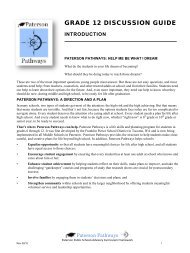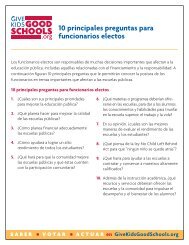Wanna Go? - Paterson Education Fund
Wanna Go? - Paterson Education Fund
Wanna Go? - Paterson Education Fund
Create successful ePaper yourself
Turn your PDF publications into a flip-book with our unique Google optimized e-Paper software.
EOF makes college happen for needy students<br />
BY JAMICKA EVANS<br />
Many disadvantaged students who meet eligibility may find their<br />
way to college through the state’s Equal Opportunity <strong>Fund</strong> program.<br />
Also known as “EOF” the program was created in 1967, and now<br />
has 42 New Jersey’s community<br />
colleges and public and private<br />
four-year colleges and universities<br />
in its participation.<br />
However, the actual number<br />
of available spaces at each<br />
college or university is limited.<br />
To participate in an EOF program,<br />
students must be New<br />
Jersey residents and must apply<br />
to a New Jersey college or<br />
university and file a Free Application<br />
for Federal Student Aid.<br />
Because EOF is a campus-based<br />
program, each campus is responsible<br />
for student recruitment,<br />
selection, program services, and<br />
its own specific criteria for EOF<br />
admission and program participation.<br />
Students must complete the<br />
college’s EOF form when they fill<br />
out the college application. Although a student may not think they<br />
qualify based on their income calculations, they should apply.<br />
“Its better that they deny you, than you deny yourself,” said<br />
John F. Kennedy High School guidance counselor Mrs. Amelia Wright.<br />
EOF provides financial assistance and support services including<br />
Beware of scams that promise...<br />
* “This scholarship is guaranteed, or<br />
your money back.”<br />
This statement is not true because<br />
scholarships can never be guaranteed.<br />
* “You can’t get this information<br />
anywhere else.”<br />
Students can find mostly all the<br />
information they need for free at<br />
CollegeData’s Scholarships Finder .<br />
* “I just need your credit card or bank<br />
account number to hold this<br />
scholarship.”<br />
This is a hacker’s way of saying that<br />
they want all of a student’s parent’s<br />
information and money. The money<br />
will never be found again.<br />
* “We’ll do all the work.”<br />
A company will not be able to write a<br />
resume or fill out an application for<br />
students. Also, if the company will fill<br />
out a student’s FAFSA form, DO<br />
NOT do it because there is personal<br />
information needed that only your<br />
parent or guardian can only answer.<br />
* “The scholarship will cost some<br />
EOF Proposed Eligibility Requirments<br />
for Academic Year 2007-2008<br />
Applicants with<br />
Household Size Not to Exceed Gross Income<br />
1 $19,600<br />
2 $26,400<br />
3 $33,200<br />
4 $40,000<br />
5 $46,800<br />
6 $53,600<br />
7 $60,400<br />
8 $67,200<br />
** For each additional member of the<br />
household add $6,800.<br />
money.”<br />
You do not have to pay anything for a<br />
scholarship.<br />
* “You’ve been selected by a national<br />
foundation to receive a scholarship.”<br />
If students didn’t apply for a program<br />
that offers this type of scholarship,<br />
then the student should not answer the<br />
scam.<br />
* “Official -sounding names”<br />
Never check out a site that no one<br />
knows about. These “official names”<br />
make their own websites.<br />
* “Membership fee”<br />
Some “societies give” scholarships for<br />
a fee. Do not give any kind of<br />
payment. One scam to look out for is<br />
“The National Honor Society” which<br />
gives official looking mail with a $45-<br />
$50 membership fee.<br />
* “Billions of dollars in unclaimed<br />
scholarships.”<br />
The monies are really for children<br />
whose parents/family member work<br />
for the sponsoring company.<br />
counseling, tutoring, developmental course work, to students from<br />
educationally and economically disadvantaged backgrounds who attend<br />
state colleges. The program begins right after high school graduation.<br />
Grants are available for both<br />
undergraduate and graduate<br />
studies. Undergraduate grants<br />
range from $200 - $2,500 and<br />
graduate grants from $200 -<br />
$4,350 depending on the type of<br />
institution and financial need.<br />
The EOF Program also administers<br />
the Martin Luther King<br />
Physician-Dentist Scholarship for<br />
students pursuing degrees in<br />
medicine or dentistry at the<br />
University of Medicine and Dentistry<br />
of New Jersey and the C.<br />
Clyde Ferguson Law Scholarship<br />
for students pursuing graduate<br />
studies in law at Rutgers, the<br />
State University or Seton Hall<br />
University.<br />
The Martin Luther King<br />
Physician-Dentist and the C.<br />
Clyde Ferguson Law Scholarships<br />
are available only to graduate students attending institutions within<br />
New Jersey.<br />
For additional information, contact the Commission on Higher<br />
<strong>Education</strong>, EOF Office at (609) 984-2709.<br />
Foster children get special financial<br />
assistance for college<br />
BY ASHLEY JOHNSON<br />
College costs can be overwhelming to any<br />
student but there are special opportunities<br />
for college bound students in foster care.<br />
New Jersey has over 7,000 foster children. The<br />
federal government provides most students with<br />
financial aid. including the Pell Grant, Supplemental<br />
<strong>Education</strong> Opportunity Grant and the Tuition Aid<br />
Grant. Financial aid is assistance given to students<br />
who are in need of money that plan to expand their<br />
knowledge by going to college, a university or a<br />
trade school.<br />
Two scholarships programs in New Jersey that aid foster youth are<br />
Foster adoptive Family Services Academic Scholarships Opportunity<br />
Grants and Brochure (FAFS) and the New Jersey Foster Care (NJFC)<br />
Scholars Program. Students involved in these programs will be accommodated<br />
with tuition and fees, room and board, books and supplies,<br />
transportation, computer special equipment, child care costs.<br />
According to the American School Board Journal, foster children<br />
are most likely to repeat a grade and are twice as likely to drop out<br />
before graduation. The financial assistance lessens the burden for such<br />
students. For more information, visit www.cafsnj.org/services or for<br />
scholarship information please see www. FAFSAonline.org/<br />
scholarship.html.<br />
17




